You
I know how frustrating it can get with all those assignments mate.
Nursing Being my main profession line, i have essential guides that are A graded, I am a very friendly person so don
- 4090
- 0
- 242
Community
- Followers
- Following
1492 Reviews received
4359 items
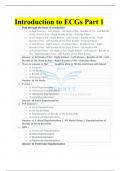
Introduction to ECG Part 1 - Comprehensive Question and Answer Session with a Perfect 100% Accuracy
Path through heart of conduction There is a pause in the ______ to allow atria to fill the ventricles with blood P wave = P-R interval = QRS = Q-T interval = ST segment = T wave =
- Exam (elaborations)
- • 12 pages •
Path through heart of conduction There is a pause in the ______ to allow atria to fill the ventricles with blood P wave = P-R interval = QRS = Q-T interval = ST segment = T wave =
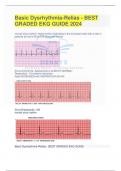
Basic Dysrhythmia-Relias - BEST GRADED EKG GUIDE 2024
Basic Dysrhythmia-Relias - BEST GRADED EKG GUIDE 2024 normal sinus rhythm Sinus Arrhythmia Sinus Bradycardia Sinus Tachycardia Premature Atrial Contraction (PAC)
- Exam (elaborations)
- • 8 pages •
Basic Dysrhythmia-Relias - BEST GRADED EKG GUIDE 2024 normal sinus rhythm Sinus Arrhythmia Sinus Bradycardia Sinus Tachycardia Premature Atrial Contraction (PAC)
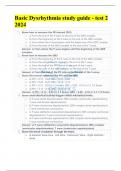
Basic Dysrhythmia study guide - test 2 Latest 2024
Know how to measure the PR interval ( PRI)Know how to measure the QRSKnow the normal values for the PRI and the QRS Know what electrical activity triggers which mechanical event. For example what electrical event represents atrial contraction? Know the blood circulation through the heart, starting from the superior vena cava and progressing through the right side of the heart, the lungs and the left side, ending up finally going through the aortic valve and into the aorta. Know the electrical co...
- Exam (elaborations)
- • 4 pages •
Know how to measure the PR interval ( PRI)Know how to measure the QRSKnow the normal values for the PRI and the QRS Know what electrical activity triggers which mechanical event. For example what electrical event represents atrial contraction? Know the blood circulation through the heart, starting from the superior vena cava and progressing through the right side of the heart, the lungs and the left side, ending up finally going through the aortic valve and into the aorta. Know the electrical co...
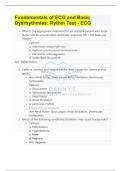
Fundamentals of ECG and Basic Dysrhythmias: Rythm Test - ECG
Fundamentals of ECG and Basic Dysrhythmias: Rythm Test - ECG 1. What is the appropriate treatment for an unstable patient with atrial flutter and an uncontrolled ventricular response; HR >150 beats per minute?Caffeine, alcohol, and fatigue can be likely causes for (Select all that apply.)Which of the following conditions/situations may cause bradycardia?Which of the following is an accurate statement about sinus bradycardia?Sinus tachycardia is defined as a sinus rhythm at a rate of __...
- Exam (elaborations)
- • 11 pages •
Fundamentals of ECG and Basic Dysrhythmias: Rythm Test - ECG 1. What is the appropriate treatment for an unstable patient with atrial flutter and an uncontrolled ventricular response; HR >150 beats per minute?Caffeine, alcohol, and fatigue can be likely causes for (Select all that apply.)Which of the following conditions/situations may cause bradycardia?Which of the following is an accurate statement about sinus bradycardia?Sinus tachycardia is defined as a sinus rhythm at a rate of __...

Dysrhythmias and EKG Interpretation (NCLEX Questions and Answers)
A nurse is assessing an electrocardiogram rhythm strip. The P waves and QRS complexes are regular. The PR interval is 0.16 second, and QRS complexes measure 0.06 second. The overall heart rate is 64 beats per minute. The nurse assesses the cardiac rhythm as: A nurse notices frequent artifacts on the ECG monitor for a client whose leads are connected by cable to a console at the bedside. The nurse examines the client to determine the cause. Which of the following items is unlikely to be resp...
- Exam (elaborations)
- • 2 pages •
A nurse is assessing an electrocardiogram rhythm strip. The P waves and QRS complexes are regular. The PR interval is 0.16 second, and QRS complexes measure 0.06 second. The overall heart rate is 64 beats per minute. The nurse assesses the cardiac rhythm as: A nurse notices frequent artifacts on the ECG monitor for a client whose leads are connected by cable to a console at the bedside. The nurse examines the client to determine the cause. Which of the following items is unlikely to be resp...
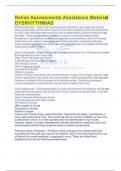
Relias Assessments Assistance Material DYSRHYTHMIAS Questions and Answers 2024
Relias Assessments Assistance Material DYSRHYTHMIAS 2024 EKG interpretation - One of the most useful and commonly used diagnostic tools is electrocardiography (EKG) which measures the heart's electrical activity as waveforms. An EKG uses electrodes attached to the skin to detect electric current moving through the heart. These signals are transmitted to produce a record of cardiac activity. Arrhythmia or dysrhythmia are disturbances in the normal cardiac rhythm of the heart which occurs as a...
- Exam (elaborations)
- • 5 pages •
Relias Assessments Assistance Material DYSRHYTHMIAS 2024 EKG interpretation - One of the most useful and commonly used diagnostic tools is electrocardiography (EKG) which measures the heart's electrical activity as waveforms. An EKG uses electrodes attached to the skin to detect electric current moving through the heart. These signals are transmitted to produce a record of cardiac activity. Arrhythmia or dysrhythmia are disturbances in the normal cardiac rhythm of the heart which occurs as a...
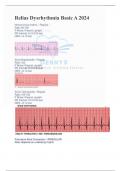
Relias Dysrhythmia Basic A Questions and Answers Latest 2024
Relias Dysrhythmia Basic A Questions and Answers Latest 2024 Normal sinus rhythm – Regular Rate: 60-100 P Wave: Present, upright PR Interval: 0.12-0.20 sec QRS: <0.12 sec Sinus Bradycardia - Regular Rate: <60 P Wave: Present, upright PR Interval: 0.12-0.20 sec QRS: <0.12 sec Sinus Tachycardia - Regular Rate: 100-150 P Wave: Present, upright PR Interval: 0.12-0.20 sec QRS: <0.12 sec........
- Exam (elaborations)
- • 10 pages •
Relias Dysrhythmia Basic A Questions and Answers Latest 2024 Normal sinus rhythm – Regular Rate: 60-100 P Wave: Present, upright PR Interval: 0.12-0.20 sec QRS: <0.12 sec Sinus Bradycardia - Regular Rate: <60 P Wave: Present, upright PR Interval: 0.12-0.20 sec QRS: <0.12 sec Sinus Tachycardia - Regular Rate: 100-150 P Wave: Present, upright PR Interval: 0.12-0.20 sec QRS: <0.12 sec........

Dysrhythmias- EKG interpretation Questions and Answers Latest 2024
Dysrhythmias- EKG interpretation Questions and Answers Latest 2024 Dysrhythmias- EKG interpretation Questions and Answers Latest 2024 Dysrhythmias- EKG interpretation Questions and Answers Latest 2024 Dysrhythmias- EKG interpretation Questions and Answers Latest 2024 Dysrhythmias- EKG interpretation Questions and Answers Latest 2024 Dysrhythmias- EKG interpretation Questions and Answers Latest 2024
- Exam (elaborations)
- • 3 pages •
Dysrhythmias- EKG interpretation Questions and Answers Latest 2024 Dysrhythmias- EKG interpretation Questions and Answers Latest 2024 Dysrhythmias- EKG interpretation Questions and Answers Latest 2024 Dysrhythmias- EKG interpretation Questions and Answers Latest 2024 Dysrhythmias- EKG interpretation Questions and Answers Latest 2024 Dysrhythmias- EKG interpretation Questions and Answers Latest 2024
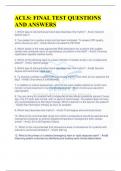
ACLS: FINAL TEST QUESTIONS AND ANSWERS 100% CORRECT 2024
Which type of atrioventricular block best describes this rhythm?2. Your patient is in cardiac arrest and has been intubated. To assess CPR quality, which should you do?3. Which facility is the most appropriate EMS destination for a patient with sudden cardiac who achieved return of spontaneous circulation in the field?4. Which of the following signs is a likely indicator of cardiac arrest in an unresponsive patient?Which type of atrioventricular block best describes this rhythm?. To properly ven...
- Exam (elaborations)
- • 4 pages •
Which type of atrioventricular block best describes this rhythm?2. Your patient is in cardiac arrest and has been intubated. To assess CPR quality, which should you do?3. Which facility is the most appropriate EMS destination for a patient with sudden cardiac who achieved return of spontaneous circulation in the field?4. Which of the following signs is a likely indicator of cardiac arrest in an unresponsive patient?Which type of atrioventricular block best describes this rhythm?. To properly ven...
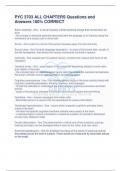
PYC 3703 ALL CHAPTERS QUESTIONS AND ANSWERS
Action potential - Ans - a neural impulse; a brief electrical charge that travels down an axon - the change in electrical potential associated with the passage of an impulse along the membrane of a muscle cell or nerve cell. Axons - Ans a part of a neuron that carries impulses away from the cell body Broca's area - Ans Controls language expression - an area of the frontal lobe, usually in the left hemisphere, that directs the muscle movements involved in speech. Cell body - Ans Larges...
- Exam (elaborations)
- • 28 pages •
Action potential - Ans - a neural impulse; a brief electrical charge that travels down an axon - the change in electrical potential associated with the passage of an impulse along the membrane of a muscle cell or nerve cell. Axons - Ans a part of a neuron that carries impulses away from the cell body Broca's area - Ans Controls language expression - an area of the frontal lobe, usually in the left hemisphere, that directs the muscle movements involved in speech. Cell body - Ans Larges...

Property & Casualty Insurance License Test Updated 2022 > Pass the P&C Insurance Licensing Exam With Flying Colors.
Electrical Level 3 Module 1 Load Calculations and Branch Feeder Circuits Quiz
Advanced health assessment: NUR 504 Quiz 4 with Correct Answers
BIBL 410 Weekly Study Questions 1 Liberty University answers complete solutions.
Josephine Morrow Documentation Assignments (answered) 100% score